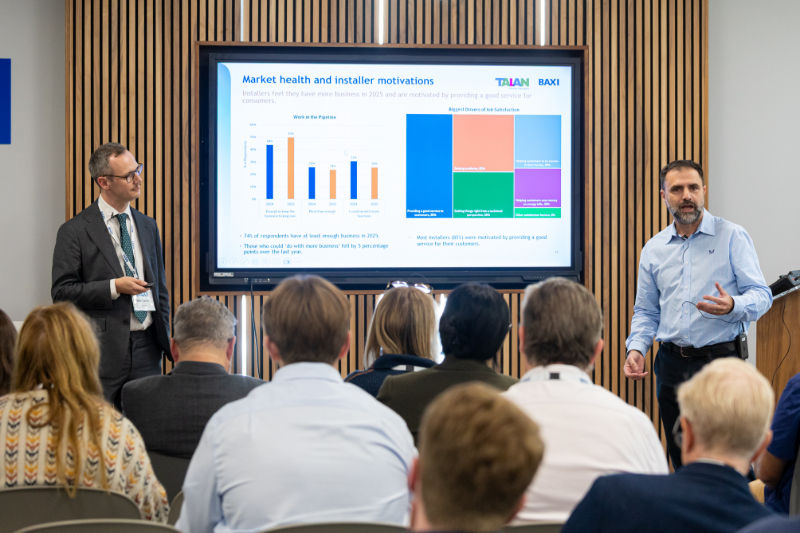
Greater than half (59%) of UK heating engineers are both already or more likely to work with different firms to develop warmth pump competencies, in keeping with heating and sizzling water options supplier Baxi’s fourth annual Installer Expertise Survey.
Nevertheless, a scarcity of shopper demand stays the primary barrier to warmth pump uptake – with 60% of installers citing this as the primary barrier.
The 2025 Survey additionally confirmed that attitudes of some segments of the heating engineer inhabitants have gotten extra sceptical of warmth pumps and in direction of internet zero extra broadly.
The survey – carried out with inexperienced provide chain consultancy Talan (previously Gemserv) – gathered responses from virtually 400 installers.
The research discovered that 59% of installers are both already growing the talents to suit warmth pumps or intending to take action throughout the subsequent few years.
The variety of installers citing a scarcity of coaching as a barrier has fallen by 18 share factors in contrast with 2024, suggesting that business funding in coaching is starting to repay. Baxi says that it has seen over 1,000 installers attend its personal warmth pump coaching programs during the last 12 months.
Work motivation
When requested what drives them of their work, heating engineers most regularly cited offering an excellent service to clients (85%), fixing technical issues (62%), and getting issues proper from a technical perspective (50%). Based on Baxi, this sense of professionalism partly explains why some installers hesitate to advocate new applied sciences till they really feel totally competent.
“Installers clearly wish to do the fitting factor for his or her clients,” stated Ian Trott, Head of Coaching at Baxi UK. “Many take pleasure of their technical capacity and gained’t compromise on service till they’ve constructed actual hands-on expertise with the know-how. Coaching for a qualification is one factor – however coaching for competence is what’s actually wanted to maneuver the needle on installer engagement.”
Hybrids – a sensible bridge
The 2025 survey additionally discovered that 35% of installers have or can be considerably or extraordinarily more likely to transfer to becoming warmth pumps as a part of a hybrid system, the place a warmth pump works alongside an present combi boiler, slightly than as a full warmth pump solely substitute. Not like a stand-alone warmth pump system, hybrids usually don’t require a water cylinder making the set up decrease value, faster, much less disruptive.
“Hybrids generally is a highly effective transitional step,” Trott stated. “They’re typically extra enticing to installers as a result of they’re simpler to suit, and to clients as a result of they require much less value and disruption. Analysis exhibits a well-installed hybrid can minimize a house’s heating carbon footprint by round 70% a 12 months or extra. Supporting hybrid choices would give extra installers worthwhile real-world expertise and assist owners see the advantages earlier.”
Paperwork – a significant impediment
Whereas attitudes to warmth pumps have shifted positively, shopper demand is growing extra slowly. Though many households proceed to desire a simple like-for-like boiler substitute, 2024 was nonetheless a report 12 months for UK warmth pump gross sales.
Nearly half of respondents – 46% – named the paperwork concerned in authorities schemes as a significant impediment to putting in warmth pumps.
Baxi says it is going to launch its personal MCS Umbrella scheme later this 12 months, designed to cut back the executive workload for smaller companies and sole merchants. The corporate has additionally expanded its hands-on coaching programme and elevated on-line and video-based academic assets produced at its Warwick Options Academy.
Generational divide
A recurring theme in Baxi’s annual surveys has been a generational divide in attitudes to retraining. Installers approaching retirement are usually much less inclined to spend money on growing new abilities, whereas these earlier of their careers are extra open to diversifying their experience.
The survey additionally famous that a big proportion of UK warmth installers work both as sole merchants or in very small groups. This construction could make it harder for them to take outing for coaching or to handle the extra paperwork that usually accompanies low-carbon installations. Many respondents stated they anticipate to collaborate or companion with different service suppliers to satisfy future demand for clear warmth applied sciences.
“These findings present that regardless of some hardening of opinions most gasoline boiler installers aren’t dogmatic about know-how and simply wish to do an excellent job for his or her clients.
“Many installers are getting ready for the longer term, with plans to arrange for the uptake of warmth pumps and develop their abilities. In consequence, extra installers are snug speaking to their clients about vitality effectivity and fewer say that coaching is a barrier than in final 12 months’s research. It exhibits that the work the sector is doing to encourage coaching is working,” stated Will Taylor, Principal Guide at Talan.
*Nearly 400 installers took half in Baxi’s 2025 survey, which was carried out in July and August 2025.
Picture: Baxi